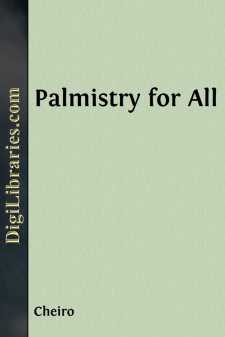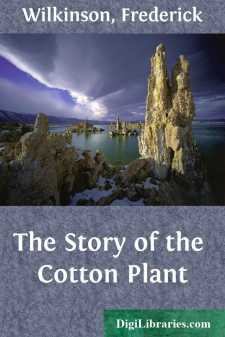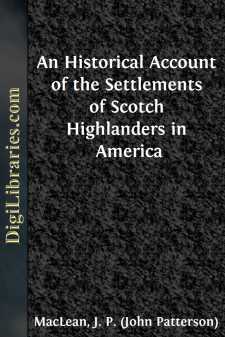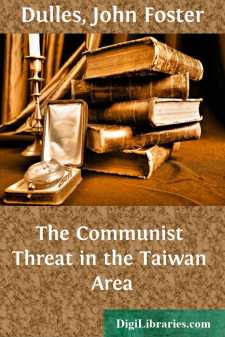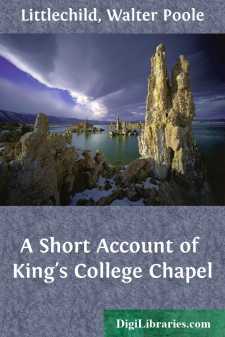Non-Classifiable
- Non-Classifiable 1768
Non-Classifiable Books
Sort by:
by:
James Crabb
PREFACE. The Author of the following pages has been urged by numerous friends, and more particularly by his own conscience, to present to the Christian Public a brief account of the people called Gipsies, now wandering in Britain. This, to many readers, may appear inexpedient; as Grellman and Hoyland have written largely on this neglected part of the human family. But it should be recollected, that...
more...
by:
Gertrude Stein
A CARAFE, THAT IS A BLIND GLASS. A kind in glass and a cousin, a spectacle and nothing strange a single hurt color and an arrangement in a system to pointing. All this and not ordinary, not unordered in not resembling. The difference is spreading. GLAZED GLITTER. Nickel, what is nickel, it is originally rid of a cover. The change in that is that red weakens an hour. The change has come. There is no...
more...
by:
Cheiro
PREFACE TO THE AMERICAN EDITION There is no country in the world where the "study of character" is more indulged in than in the United States of America. During my many visits there I could not help remarking how even the "hardest headed" business men used any form of this study that they could get hold of to help them in their business dealings with other men and also in endeavouring...
more...
CHAPTER I. ORIGIN, GROWTH, AND CHIEF CULTIVATED SPECIES OF COTTON PLANT. In the of this little work is a picture of a cotton field showing the plants bearing mature pods which contain ripe fibre and seed, and in stands a number of bobbins or reels of cotton thread, in which there is one having no less than seventeen hundred and sixty yards of sewing cotton, or one English mile of thread, on it. As both...
more...
by:
Hugh Smith
INTRODUCTION. As two of the four meals that form our daily subsistence are chiefly composed of tea, an enquiry into what kind is the most salutary must be as necessary as it may prove interesting and beneficial; for, on the choice of proper or improper tea must greatly depend the health or disease of the public in general. To this may be attributed the constitution being either preserved from that...
more...
CHAPTER I. The Highlanders of Scotland. A range of mountains forming a lofty and somewhat shattered rampart, commencing in the county of Aberdeen, north of the river Don, and extending in a southwest course across the country, till it terminates beyond Ardmore, in the county of Dumbarton, divides Scotland into two distinct parts. The southern face of these mountains is bold, rocky, dark and...
more...
by:
Nehemiah Adams
Chapter First. Probabilities of an Ordinance for Children. 'Tis aye a solemn thing to meTo look upon a babe that sleeps,Wearing in its spirit-deepsThe unrevealed mysteryOf its Adam's taint and woe.—Miss Barrett. Heaven lies about us in our infancy.—Wordsworth. It is generally believed that, of those who have gone to heaven from this world, by far the larger part have been infants and...
more...
CHAPTER I WANTED: A MAN—THE MAN FOUND Just at the most severe crisis of the war between France and Germany, over thirty years ago, a London newspaper, in describing the situation, remarked that France wanted not men, but a Man. During a whole generation which followed after the close of the gigantic and sanguinary conflict between the Northern and Southern States of the American Republic, a similar...
more...
The Communist Threat in the Taiwan Area 1. Statement by Secretary Dulles, September 4, 1958 I have reviewed in detail with the President the serious situation which has resulted from aggressive Chinese Communist military actions in the Taiwan (Formosa) Straits area. The President has authorized me to make the following statement. 1. Neither Taiwan (Formosa) nor the islands of Quemoy and Matsu have ever...
more...
The FoundationIN the year 1441 Henry VIfounded King's College for a Rector and twelve scholars. He remodelled his plan in 1443, and styled his foundation the College of St. Mary and St. Nicholas.It was to consist of a Provost, seventy Fellows, or Scholars, together with Chaplains, Lay Clerks, and Choristers. The court was originally on the north side of the present chapel opposite Clare College,...
more...




